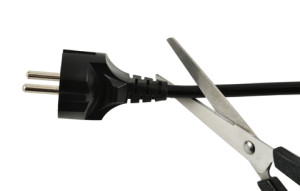5 Easy Ways to Save Money While at Home
If you’re trying to stretch your paycheck a little further these days, you’re not alone. With prices rising on everything from food to fuel oil, it seems like everyone is looking for new ways to save. Once you’ve covered the obvious cutbacks, like brewing coffee at home, packing your own lunch and saying goodbye to the premium cable package, it may seem like your only recourse is to search for a second job. But with a little creativity, you can find plenty of other ways to save money at home. It’s true that some might require a bit of sacrifice, but the payoff can be huge, and you don’t have to turn to extreme couponing to reap significant savings. Here are our five surprising tips for saving money at home.
1. Cut Down Your Electric Bill

You’re probably already diligent about turning off lights when you leave a room and setting your thermostat a few degrees cooler in the winter or warmer in the summer. But did you know that you can save an estimated 5 to 10 percent on your electric bill by unplugging your appliances when you aren’t using them?
Many electronic gadgets and appliances consume power when they’re turned off but still plugged in to an outlet, a phenomenon known as phantom power. To reduce phantom power consumption in your home, plug appliances such as phone chargers, TVs, DVD players and computers into power strips, then turn off the power strips when the devices aren’t in use. (Just be sure to follow normal shutdown procedures before you cut power to things like computers and other sophisticated electronics.)
Many electric companies offer free energy audits that show you where your utility dollars are going. While the audit itself won’t save you money, many of the remedies your auditor recommends are likely to be inexpensive DIY projects like leaky windows or missing insulation, and you’ll see the difference in your bills once you make any recommended upgrades or repairs [source: Energy Star].
If you have central air conditioning, see if your electric company offers one of the increasingly popular A/C savings programs, which pay you anywhere from $100 to $200 per year for letting the power company shut down your air conditioner for a short period of time each hour. Your energy provider will install a switch with a small radio receiver on your air conditioning unit, and then remotely cycle your A/C as needed during peak usage hours to reduce your energy consumption without compromising your comfort. In addition to the credits you earn from the electric company, you’ll save a bit on the electricity it takes to run your A/C.
To make sure the cost of repairs to your HVAC system doesn’t blow a hole in your budget, read on to see if a home warranty can help you save money.
2. Think About a Home Warranty

We should mention right up front that this tip won’t be the right choice for everyone. But if you’re buying a home or you live in one that’s older, a home warranty just might save you some money this year.
A home warranty is an insurance policy on specific household appliances, such as water heaters or garbage disposals, and systems, such as the plumbing and HVAC. Home warranties typically cost somewhere between $300 and $500 a year, plus a deductible of $50 to $100 per service call [sources: Braley; Stewart Home Warranty]. If you live in a brand new home or you’ve recently upgraded your major appliances, a home warranty probably doesn’t make sense, since it’s likely that you’re still covered under builder or manufacturer warranties.
Admittedly, the purchase of a home warranty can be something of a gamble, since you can never know for sure when your water heater will spring a leak or your furnace will fail. But if your major “built-in” appliances are more than 10 years old and it’s been a while since your last repair, a home warranty can be a good bet. If you’re buying a resale home, ask the seller to include a one-year home warranty as a condition of the sale. It’s a small price for the seller to pay, and it can help you avoid unexpected expenses when you’re most strapped for cash.
Every home warranty is different, so shop around for the one that best fits your needs, and be sure you read the fine print to understand what’s covered.
3. Just Do-It-Yourself. Doing Simple Repairs Around The House Could Save You Big Bucks

If you have home improvement projects or repairs that can’t wait, look for free DIY workshops at places like The Home Depot, Lowe’s or your local hardware store. The workshops cover everything from installing outdoor lighting to refinishing furniture and cabinets to designing and installing a tile floor or backsplash [source: The Home Depot].
Of course, unless you really know what you’re doing, save big jobs like electrical wiring and complicated plumbing work for the pros, or you may create a situation that’s even more costly to correct, not to mention dangerous.
Many home improvement centers offer free weekend classes for kids, too. While your little helpers may not be able to lend a hand on every DIY undertaking, the classes provide a chance for them to develop their skills and even make crafts that they can give as gifts. And if you like the idea of fashioning your own handmade pieces, consider low-cost wood-working classes or craft workshops held at local community colleges or adult night school programs, where you can use their tools and equipment as you learn to make things for your home or one-of-a-kind gifts for family and friends
4. If You Can Pay Your mortgage… or Not

This is another tip that depends on your individual situation. Making an extra mortgage payment each year can save you thousands of dollars in interest over the course of a 30-year loan. But for some homeowners, even those who may already be paying down the principal each year, it makes more sense to put that extra cash to use somewhere else. First, let’s look at when not to pay down your mortgage.
Mortgage rates have been hovering at or near historical lows for a few years now. If you have an interest rate in the 4 to 5 percent range, you’d be better off building an emergency savings fund, contributing to an employer-matched 401(k) plan or paying down higher interest credit cards, particularly since your mortgage interest is usually tax deductible, unlike the interest you pay on other debts [source: Lankford].
If your mortgage rate is higher than 5 percent, consider refinancing while rates are low. You could end up with more cash in your pocket every month to put toward savings or other loan payments. Sites like Bankrate.com offer calculators that allow you to plug in all sorts of scenarios to see which one saves you the most.
If you’ve paid down your other debts and the rest of your financial picture is in order, there’s something to be said for the financial and psychological benefits of getting out of mortgage debt as fast as you can. To make an extra mortgage payment each year, divide your normal mortgage payment by 12 and add that amount to your monthly payment. Be sure to tell your mortgage lender to apply the extra amount toward your principal balance. Yes, you’ll actually be paying more per month in the short term, but the long-term savings can be significant, and well worth it.
5. Ask your Service Providers To Reduce Monthly Payment

As you look for ways to cut spending, remember two things: First, almost everything is negotiable, and second, it never hurts to ask. Take inventory of the bills you pay each month or each year, and go down the list one by one, asking each provider to help you save money so that you don’t have to cancel their service in favor of a cheaper one. Here are a few places to start:
Credit cards — As long as you have a good payment history, your credit card company will often agree to lower your interest rate just for the asking. Of course, it can’t hurt to remind them that you’re prepared to transfer to a lower-interest card if they can’t help you out. Just be sure you have another offer at the ready if that’s the route you take.
Heating oil or natural gas — See if your provider will let you lock in to a lower rate for signing a winter delivery contract up front or spreading your payments out over the year. You might also try teaming up with your neighbors or your homeowners association to negotiate a discounted neighborhood rate.
Cable — No, we’re not going to tell you to cut it altogether, and we assume you already know that you can often save by bundling TV, Internet and telephone services. If you can’t live without your favorite sports programs or shows, call the cable company and ask for the customer retention department. Tell the representative who answers the phone that you are considering switching providers to save money. When the cable company offers a lower rate, ask them if that’s the best they can do. Be sure you understand the terms of any new offers. If your special rate will expire after six or 12 months, put a note on your calendar and call back at that time.
Insurance — You already know that you can shop rates, but before you switch providers, ask your current insurance agent if you qualify for a loyalty discount or a safe-driver savings program. A bare bones insurance policy from a discount provider can be one of those you-get-what-you-pay-for scenarios, so if you do decide to switch companies, be sure you compare coverage plans closely so you understand what you’re giving up.
Local Records Office | 5 Easy Ways to Save Money While at Home









